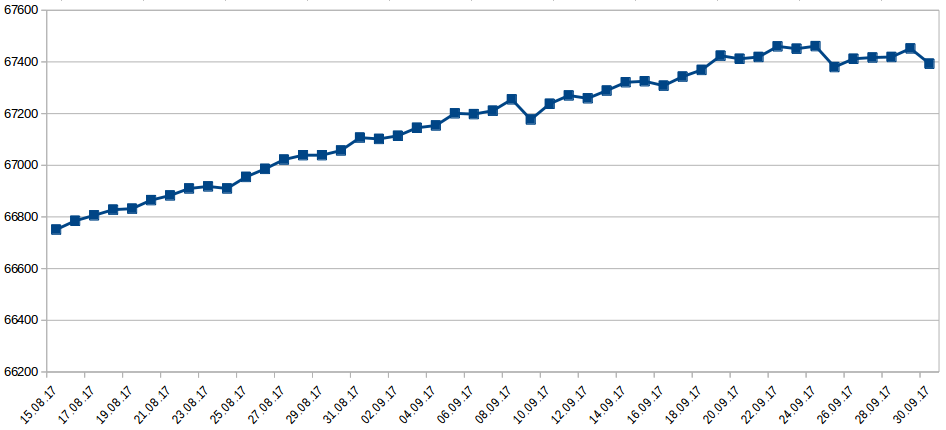number of keys grows, and grows, and grows ...
Posted by Harald Hartmann on 1 October 2017 in English.In the past three weeks (starting from 10th Sep) I have worked on the OSM Latest Keys list almost every day (with an average of one hour each time). In doing so, I have strictly adhered to
If using information from this page to make changes to the OSM database - please keep in mind the usual guidelines: No mechanical edits, no changes without checking validity of tags, inform the original mapper politely, don’t delete any relevant information…
and didn’t make a single change itself, but instead wrote nearly 500 changeset comments.
Of these 500 changeset comments, only half of the comments were answered and the error addressed was corrected by the original mapper. In the other half it was felt so (exact numbers I could not find unfortunately), that in turn the half corrected itself (without a reply by changeset comment to confirm), and the other half fixed by other mappers (eg mueschel , Thomas8122, mapper999, and others).
I personally hoped that the curve of historical development would be flatter. For this I then created the following graphic today, which show the last three weeks as well as the three weeks before the start of my action:

Yes, it was flatter, but not as flat as I had hoped. Of the approximately 990 new keys in the last three weeks, only about 330, so only one third have disappeared again, the other two thirds have remained … and will probably remain, since there are no more simple misspellings or incorrectly used keys. Well, maybe you could get 50%, but a hard fight would have to be done to convince the original mapper to keep more (abstract) to the existing tagging.
On the topic “misspellings” I had right at the beginning of the action asked in the german forum how to minimize new keys. It would be nice, if the editors would do this job, but they will probably not make more. Also the request API: check (and notificate) for new keys after close changeset, has been denied. It follows that ultimately it only helps if a series of mappers continuously work on the list mentioned above.
PS: There is also another interesting large range, if you look at the keys list and sort it by object (count): according to taginfo there are about 24,000 keys, almost one third of the total keys, which at all only one time were used! And probably a third of them are just misspellings.
PPS: Last but not least, there is the similar key list by taginfo …
Discussion
Comment from Glassman on 1 October 2017 at 16:36
Do you have a breakdown by editor of the errors?
Comment from Harald Hartmann on 1 October 2017 at 16:57
Not really. All editors are represented: OsmAnd, Vespucci, iD, JOSM, maps.me, etc. But mobile apps additionally have the following behavior: the first letter was often Uppercase, space/blank after colon, (language-dependent) auto-completion (e.g. webseite instead of website)
At the end, it is often a problem of the mapper (manually typing keys, no use of presets, etc.) rather than of the editor.
Comment from Harald Hartmann on 1 October 2017 at 17:00
And i forgot: mappers, which don’t use the wiki or taginfo ;-)
Comment from DevonshireBoy42 on 1 October 2017 at 19:12
Is there a way of getting the feature ids to fix the typos?
Comment from Harald Hartmann on 1 October 2017 at 19:40
Have you ever looked into the OSM Latest Keys list? In the last column you have 4 external hyperlinks to level0, taginfo, JOSM, OverpassTurbo.
But be careful and pay attention to the hint quoted above. It’s usually more than just fixing the error or typo!
Comment from DevonshireBoy42 on 2 October 2017 at 07:57
Thanks, it appears a lot of the typos lead to a feature which has also got a lot of other misused tags such as set of
place:*being used as an address. Complex enough that it is a case of asking what the author meant. One feature hadnamefor the feature name but thenNamefor the author’s name andbrandas the company the author was working for.Comment from carciofo on 8 October 2017 at 13:27
First off, thanks for keeping an eye out for misspellings and accidental new keys in the database. As someone who got one of your comments, I wanted take a moment to leave a note regarding “informing the original mapper politely”: perhaps there is something getting lost in translation so I’m not sure how polite “what is tag x for?!” sounds to German ears; it doesn’t strike me as particularly polite in English (especially the exclamation mark could be read as carrying some annoyance imo). Giving some context to users as to why you’re leaving a comment (especially new users) would be helpful, something along the lines is “tag x (in object y) came up as a new/unknown tag in the database”. At the end of the day, OSM’s free tagging scheme is one of the cornerstones of the project, so one wouldn’t expect a sort of Spanish- Inquisition for using a new tag ;-) Cheers.
Comment from Harald Hartmann on 8 October 2017 at 14:10
ok, the exclamation mark wasn’t really necessary (?! in combination is something of astonishment) but the question (“what is tag x for?”) itself is just objective and informal.
indeed, OSM has a free tagging scheme but should also be usable for everyone. so, who will use misspelled keys? or really new but undocumented keys, which ends up in some guesswork?